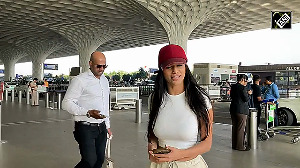His recent book In Spite of the Gods -- The Strange Rise of Modern India looks at the changing India and Luce, who was the Financial Times' South Asia bureau chief from 2001 to 2005, took nine months off to finish the book.
In the second part of his interview with Managing Editor (National Affairs) Sheela Bhatt, he discusses India's fight against terror, its altered relationship with America and about Sonia Gandhi.
Part I: 'India's growth rate not a flash in the pan'
What conflicting forces did you come across while travelling through India?
At a trivial level, travelling always restores my confidence in India. When I am in New Delhi, like a lot of people, I tend to get depressed about India! Like any political capital New Delhi's culture is nasty -- back-stabbing, self-reverential and can demoralise you.
The moment you get wind in your hair, when you are travelling, when you're getting real feedback from real people, then you get ideas. You may be in a corner of UP facing big problems and it may not be inspiring but it's energising.
You are actually seeing the proper India. Sometimes Delhi doesn't realise the other India. Has somebody in government ever stepped into a village? They talk very confidently about what's happening in India but you need to know the ground reality and give yourself a constant reality check in India.
You read about a super India but you need to balance that by travelling. We have travelled in many countries but when a country is so diverse and complex, it is difficult to generalise about India.
The more you stay in New Delhi, the easier it becomes to generalise but you need to get out of New Delhi to tell yourself that you should not be generalising. What's happening in Tamil Nadu might be opposite to what is happening in Bihar.
How do you see the contradictions within India?
India is certainly confident and Indian companies are becoming competitive and (going) global. Indians are acquiring assets in Europe, China and the United States. At the same time 45 per cent of Indian children need better nutrition.
But these two facts don't contradict each other. Both are important. It's not contradictory because India is very multi-layered and large. By the American definition around 20 per cent Americans are below the poverty line. This is extraordinary because this is the country that created the Internet; it's the country that has the technological global edge.
China has enough poverty but it is becoming an economic giant. I have to just look back and take a relative historic perspective. Look at India in 1947. The literacy ratio was 16 per cent, now for the first time in India's history a majority of the people are literate. In 1900, the world's population was a little higher than what is India's population today. You should not leave that perspective.
What pained you most while reporting in India?
Sometimes on a dark day and in a bad mood, I see the complete callousness that the political and bureaucratic elite have for the poor. It's changing slowly but it's too remarkably fragmented and hierarchical.
In your book you have written a lot about Delhi and criticised it too.
I adore Delhi. I love Delhi. From the point of view of journalism, it's quite diverse. I love talking and Delhi is quite conversational, may be less conversational than Kolkata towards which I am biased because I am the son-in-law of Kolkata.
While travelling all over the country what according to you was the real beauty of India?
I can give you the cliché about traditions, diversity, the habit of resolving social differences without resorting to conflicts but I would say the complexity of India is the most appealing.
Your national minimum sample to gauge the country's political voting preferences is 40,000 people. That's the basic methodology and you still get it wrong. In America, a combination of 2000 men and women is enough to make an accurate prediction. It's an extraordinarily difficult job to be a pollster in India.
India's diversity gives it richness of an entire human spectrum.
Do you agree with the view that India should handle terrorism unlike the West does?
After 9/11 [then] Prime Minister Atal Bihari Vajpayee and [then foreign minister] Jaswant Singh's overture to Washington was that we have suffered terrorism since many years and now, you have been a victim and we understand your pain.
On a parallel track, Washington was giving an ultimatum to Pakistan to take it or leave it. There was a huge baggage [in terms of India's own bitter experiences of terrorism without the world understanding it] in what Vajpayee and Jaswant Singh said.
It essentially said that we resent the fact that you have been evenhanded with Pakistan over Kashmir. And, now hopefully you will swing towards us. Largely that's what happened.
America is now far more direct and warm with India. However, the strategic ties between India and the USA don't mean that India accepts the role America is allocating to India. That role essentially is that we should fight shoulder-to-shoulder against global Islamic jihadi fascists who want to change our lives.
I don't think most Indians believe this nonsense. I think Indians know there is a difference between Lashkar-e-Tayiba and the Hizbul Mujahideen. There is not much of a similarity at all. They are not part of one global movement to overthrow our way of life.
The Bush administration's argument is that 'they' (Islamist jihadis) hate us for who we are. That is America's political interpretation of terrorism. But most Indians know that there are a lot of political reasons for a lot of terrorist movements.
Do you think India will be able to maintain a balance between Hindus and Muslims?
Right now there is an imbalance but eventually it will (maintain a balance). The Bharatiya Janata Party's strength has been in the urban areas and amongst middle class voters. And India is getting urbanised and becoming more middle class. Their democratic ties are with the BJP. But it turned out in the last election that the middle class doesn't vote in big numbers. This is very unusual.
The way India is adopting a consumer and technological culture and surging ahead, it will find the Rashtriya Swayamsevak Sangh as the force behind the BJP as quite outdated.
The Hindu-Muslim dynamics won't affect India at the international stage because I don't think any country ever has full internal peace. Of course, the 1993 and Gujarat riots are unacceptable and Indians will have to draw a line.
To understand the future of Hindu-Muslim relations you will have to find out what causes the problem. I think few reasons lie in its traditions but in some way it is partly modern. Any society which goes through big economic changes rapidly where people are being uprooted from villages to go to urban areas -- it is so disorienting and disruptive to the average mindset and to social psychology.
Then, you are most vulnerable to these kinds of movements for political identity. Judging the Indian experience so far and comparing it with the European experience of 1880 and 1940, I would say the Indian experience was not pleasant but I haven't seen that kind of organised killing in India.
I haven't seen that kind of passion here. Gujarat was a blot on India's democratic character. The majority in Gujarat, like all fascist movements, believed in the myth that they are in a minority even when they have an overwhelming majority.
Many of the Hindus who number more than 90 per cent of Gujarat thought that Islam should be thrown in the Arabian sea, the state is bordering Pakistan and (Chief Minister Narendra) Modi was using the kind of language which created extraordinary emotions that bore no relation with reality.
A leader like Modi with his skill can turn the key moment into a very nasty one. The Gujarat riots was one such moment. It is hard to sustain such make-believe against the reality for too long. You can't keep that temperature too high. But the BJP was thrown out of power in the next election.
In Europe, at many places, fascists killed and kept power also.
Do you think Sonia Gandhi can lead India into the 21st century successfully? What according to you are her strengths and weaknesses?
Essentially you are asking me if she is technically qualified to lead India or not. The wonderful thing about democracy is that democracy doesn't choose people on the basis of their qualifications.
Sonia Gandhi is not technically qualified but President George Bush is also not technically qualified either. I think the relevant question should be -- why is it that so many Indians have accepted her in Indian politics?
Look at how she is broadly accepted across all political parties. I don't think she is a natural politician. I don't think she considers herself to be a natural politician. I don't think she has done anything particularly brilliant or clever before or after 2004. But the outcome of the 2004 election was a lucky accident for her.
In your book there is a mention about when you and your editor met her, and she in a choked voice, spoke about secularism. Do you really believe that her heart cries for India's secularism?
Yes, I do. She herself has inherited her family's tradition to defend secularism. In the study at 10, Janpath there is a picture of Rajiv Gandhi with a garland and that says that nothing has changed in her life.
She identifies with her family tradition emotionally, becomes emotional and has tears in her eyes while talking about her husband and mother-in-law's tradition of defending secularism. She says I have to look after my husband and my mother-in-law's legacy.
Will she be accepted if she becomes the prime minister of India?
I don't think she will ever be the prime minister of India. I think it will rally all kinds of middle class people to ask why she wants to become the PM of India. There will be some rationale and reason in arguments against her and some may be nasty. She is not the prime minister and that helps her. But she should know that if she becomes prime minister it will be a troubled time because her issue will be at the centre-stage all the time. I can't believe that she doesn't know that. She has common sense.






 © 2025
© 2025